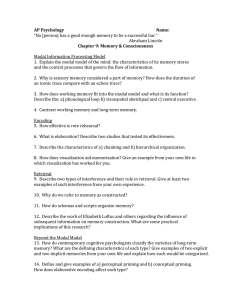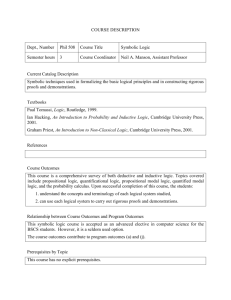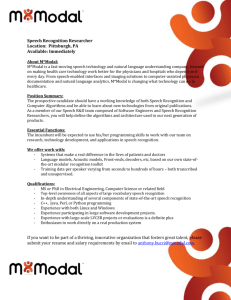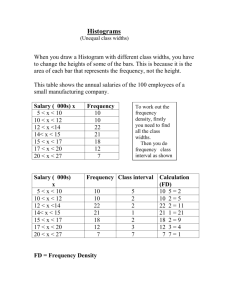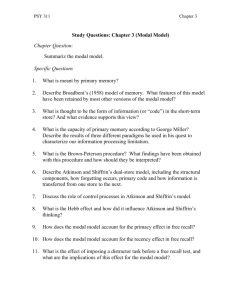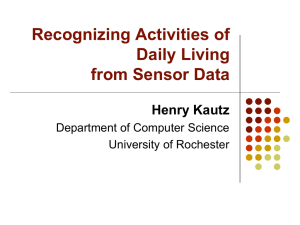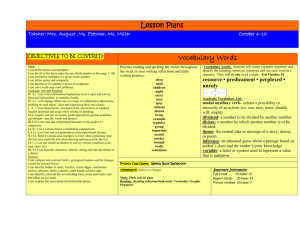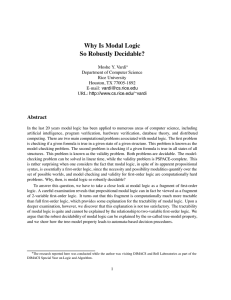University of Rochester Activities
advertisement
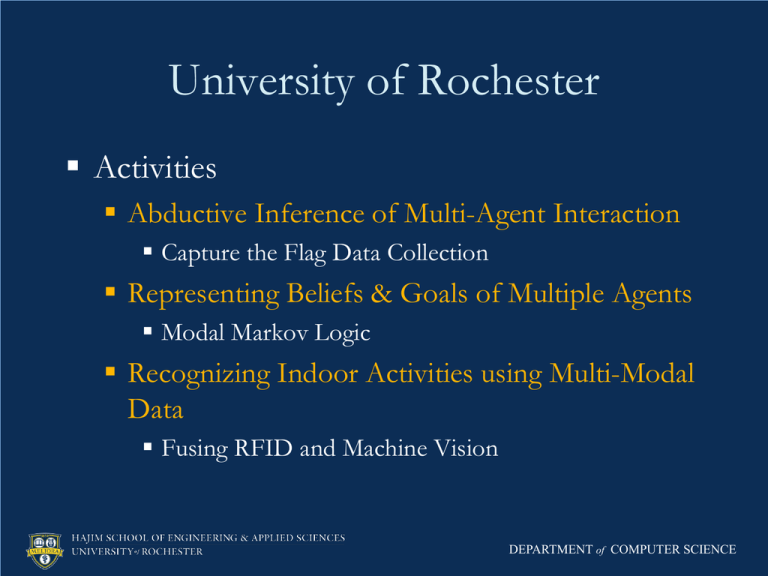
University of Rochester Activities Abductive Inference of Multi-Agent Interaction Capture the Flag Data Collection Representing Beliefs & Goals of Multiple Agents Modal Markov Logic Recognizing Indoor Activities using Multi-Modal Data Fusing RFID and Machine Vision DEPARTMENT of COMPUTER SCIENCE Multi-Agent Interaction Many agent behaviors can only be understood in the context of the actions of other agents Exercising? Being chased? Chasing someone? Location alone provides a surprisingly rich source of information about behavior GPS data can be used to learn a probabilistic model of a individual’s common activities (Liao, Fox, & Kautz 2007) Goal: learn models of groups and interactive activities Relational learning problem: ideal for ML Needed: dataset of competitive & cooperative interaction DEPARTMENT of COMPUTER SCIENCE Capture the Flag Capture the Flag Data Collection UR campus Up to 150 x 300 m area Complex topology 14 players, 8 games GPS loggers Accuracy varies 1-9 m Average game 12 m DEPARTMENT of COMPUTER SCIENCE Start of Game DEPARTMENT of COMPUTER SCIENCE End of Game 1. 2. 3. 4. red & orange guarded by green green leaves prisoners violet releases red & orange red captures flag DEPARTMENT of COMPUTER SCIENCE Ground Truth For supervised learning methods, need to create a labeled training set First attempt: record voice annotations from players Failed: players too involved to accurately comment on their actions Second attempt: post-hoc annotation Created general annotation tool for relations over GPS streams DEPARTMENT of COMPUTER SCIENCE Supervised Weight Learning Discrete features calculated from GPS streams Supervised learning applied to simple 2-slice model Precision: 46% (second by second) Recall 64% 12 hours to label 1 hour of training data DEPARTMENT of COMPUTER SCIENCE Observations Humans can accurately perceive interactive behaviors High agreement between annotators GPS noise often obscures geometric details Reasoning about intention over extended temporal context disambiguates action DEPARTMENT of COMPUTER SCIENCE Year 2 Goals Improve quality of data (features) using physical constraints Hard constraints: walls Soft constraints: paths CRF “snapping” tool Model long temporal dependencies Unsupervised learning: discover behaviors, tactics, strategies DEPARTMENT of COMPUTER SCIENCE Representing Beliefs & Goals of Multiple Agents Abduction often requires reasoning about the establishment of “propositional attitudes” Belief, desire, intention, commitment, … Example: principles of communication: If A tells B that P, then A believes P. If A tells B that P, then B will believe that A wants B to believe P. If A is cooperative with B, and B wants P, then A will want P. Such principles are defeasible DEPARTMENT of COMPUTER SCIENCE Modal Operators In logic Predicates relate one object to another Modal operators relate objects (agents) to propositions (sentences) Different modalities can be axiomatically characterized Deductive closure: Transitivity: B(a, P) B(a, P Q) B(a,Q) B(a, P) B(a, B(a, P)) DEPARTMENT of COMPUTER SCIENCE Modal Operators in Markov Logic ML defines a probability distribution over propositional truth assignments Idea: define probability distribution over assignments that are modally consistent Non-modal atoms Modal atoms Modal consistency check DEPARTMENT of COMPUTER SCIENCE Inference Complexity of consistency check Depends on target modal logic Belief (KD45): Unbounded nesting: PSPACE-complete Bounded nesting: NP-complete Modal Markov Logic Inference Rejection sampling Optimizations Cache g(M) Compute g(M) incrementally DEPARTMENT of COMPUTER SCIENCE Year 2 Goals Implement MML in Alchemy Applications Understanding indirect speech acts Capture the flag Establishing knowledge by perception Representing degrees of belief Functional modal operators B(a, B(b, P) 0.9) 0.75 DEPARTMENT of COMPUTER SCIENCE
